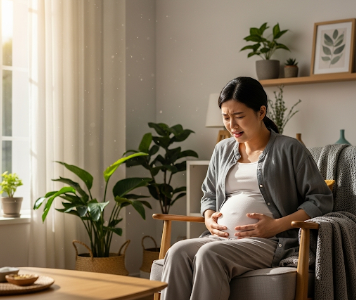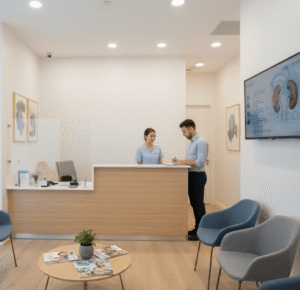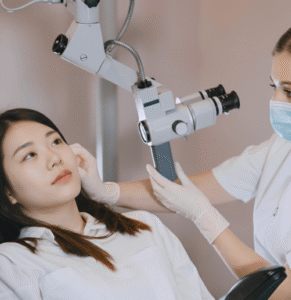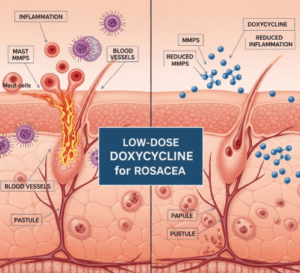Overview
Round ligament pain (RLP) is a common discomfort experienced during pregnancy, usually in the lower abdomen or groin area. The round ligaments connect the front of the uterus to the groin and stretch as the uterus grows, leading to sharp or pulling pain.
In Korea, obstetricians and gynecologists routinely manage RLP as part of prenatal care. While it is typically harmless, it can cause anxiety for expectant mothers, especially if pain is severe or persistent.
➤ Usually occurs in second trimester but can happen anytime in pregnancy
➤ Often sharp, stabbing, or pulling on one or both sides of the lower abdomen
➤ Pain is brief and associated with movement or sudden position changes
➤ Typically does not indicate a complication, but monitoring is important
Key Facts
➤ Most common during second trimester of pregnancy
➤ Triggered by sudden movements, coughing, sneezing, or rolling over in bed
➤ Can be more pronounced with multiple pregnancies or rapid uterine growth
➤ Rarely signals serious complications like appendicitis or ovarian torsion
What is Round Ligament Pain?
RLP is stretching or spasm of the round ligaments, which support the uterus. As the uterus enlarges, these ligaments stretch and thicken, sometimes causing sudden, sharp pain or a dull ache.
The pain is often short-lived and resolves with rest or position changes. However, severe or persistent pain warrants medical evaluation to rule out other causes.
What Symptoms Are Related To
Symptoms associated with RLP include:
➤ Sharp, stabbing pain in the lower abdomen or groin
➤ Pulling or stretching sensation on one or both sides
➤ Pain triggered by standing up quickly, coughing, sneezing, or twisting
➤ Occasional aching or cramping
➤ Mild discomfort radiating to hips or thighs
What Causes / Possible Causes
The primary cause of RLP is mechanical stretching of the round ligaments:
➤ Uterine growth – as the uterus expands, ligaments stretch to support its weight
➤ Hormonal changes – relaxin hormone softens ligaments, increasing susceptibility to pain
➤ Sudden movements or changes in posture – rolling, standing up, coughing, sneezing
➤ Multiple pregnancies – twins or triplets increase ligament stretching
➤ Previous abdominal surgery or pelvic conditions – may exacerbate discomfort
When Should I See My Doctor
While RLP is generally benign, see a doctor if you experience:
➤ Severe, persistent, or worsening pain
➤ Pain associated with fever, nausea, vomiting, or vaginal bleeding
➤ Pain on one side with localized tenderness (to rule out appendicitis or ovarian torsion)
➤ Changes in fetal movement or unusual contractions
➤ History of complications or high-risk pregnancy
⚠️ Prompt evaluation helps rule out more serious conditions while confirming RLP.
Care and Treatment
Self-Care & Home Remedies
➤ Rest and gentle movements – avoid sudden twisting or standing up quickly
➤ Supportive maternity belt or belly band – helps relieve ligament strain
➤ Warm compress or heating pad – reduces muscle tension and discomfort
➤ Prenatal yoga or stretching exercises – strengthen abdominal and pelvic muscles
➤ Sleep on the side with a pillow between knees – reduces ligament strain
Medical Treatments
➤ Pain relief under supervision – acetaminophen is generally safe in pregnancy
➤ Physical therapy or prenatal exercise programs – guided strengthening and stretching
➤ Regular prenatal check-ups – monitor fetal and maternal health
Treatment Options in Korea
Korean obstetrics and prenatal care centers offer comprehensive management for RLP:
➤ Diagnostics
➤ Ultrasound to rule out complications like ovarian torsion, ectopic pregnancy, or appendicitis
➤ Pelvic exam to check for uterine or ligament abnormalities
➤ Monitoring fetal wellbeing during episodes of pain
➤ Treatment Approaches
➤ Prenatal physiotherapy – exercises to relieve ligament strain
➤ Supportive devices – maternity belts, pillows, and cushions
➤ Safe pharmacologic options – acetaminophen or topical analgesics under supervision
➤ Patient education – proper posture, movement techniques, and activity modification
➤ Top Hospitals & Clinics in Korea
➤ Samsung Medical Center – Obstetrics & Gynecology
➤ Seoul National University Hospital – Prenatal care and physiotherapy
➤ Asan Medical Center – High-risk pregnancy management
➤ CHA Bundang Medical Center – Comprehensive maternal care and pain management
Final Thoughts
Round ligament pain is a normal, often unavoidable part of pregnancy. Although typically harmless, it can cause discomfort and anxiety. In Korea, expectant mothers can access specialized prenatal care, supportive therapies, and patient education to manage pain safely.
If pain is severe, persistent, or accompanied by unusual symptoms, consulting an obstetrician ensures maternal and fetal safety while ruling out serious complications.













